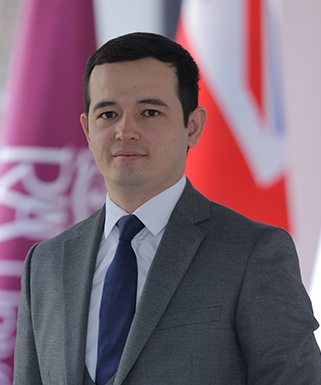MSc Sustainable Agriculture and
Food Security
Over the past year, the impact of climate change and concerns about food security have risen up the global agenda as many people continue to experience the fragility of food supply chains and devastating environmental, social and economic crises. The M.Sc. programme in Sustainable Agriculture and Food Security (SAFS) is specifically designed to address sustainable agriculture and food security globally. The programme is relevant to local and international graduates and engages with theory, concepts and approaches to food production while looking for viable solutions to sustainable agriculture and food security in various contexts and scenarios.
Course content
The MSc Sustainable Agriculture and Food Security programme has been selected specifically to address the sustainability requirements in Uzbekistan’s Agriculture Development Strategy. While supporting the transition of agriculture towards sustainable production systems is a global priority, the needs are acute in Uzbekistan and Middle Asia due to the increasingly extreme environmental conditions being accelerated by climate change.
Developments in our understanding of how to farm sustainably through embracing the complexity of integrated systems offer many opportunities to improve both environmental and food security in Uzbekistan and across the region. Students completing this programme will thus gain a comprehensive appreciation of the wide range of new and innovative approaches to sustainable farming systems that combine crops and livestock with active management of the natural environment. In addition to the subject-specific material, all Masters students will have the opportunity to learn about entrepreneurship and business management.
The programme attracts students from a wide range of backgrounds, experiences and ages. The diversity of the participants is an important dynamic in this programme and plays a key role in discussing and addressing the Sustainable Development Goals (SDG) related to food and farming. This diversity encourages new and alternative ways of rethinking agricultural and food systems, improving livelihoods and protecting the environment. Students within the programme learn key competencies that are relevant to public administration, international development/funding agencies, research and business sectors.
Modules
Throughout the programme, students will develop critical skills in observation, thinking and analysis to engage with the development of technology and innovation in agriculture and food. This will be enhanced by access to practical knowledge and commercial expertise acquired through contact with farm managers, organisations, employers and entrepreneurs.
Core Modules
U4413 – Research Skills
U4414 – Dissertation
New – Sustainable Agricultural Systems
New – International Rural Development and Food Security
New – Leadership and Business Strategy
New – Applied Natural and Environmental Science
New – English for Academic Purposes
Careers and graduate destinations
This degree programme has been established in response to the Uzbekistan Government’s recognition of skills shortages in sustainable agriculture and food security, focussing on new knowledge about sustainable production systems and new approaches to addressing food justice and security. This will be of particular relevance to many agri-food professionals seeking to improve their skills and qualifications. A part-time route will be offered to meet the needs of these candidates.
The degree will also be of interest to recent graduates in agriculture and agri-business who want to improve their knowledge and career potential. Graduates of this programme will have a wide range of career opportunities within agri-business, agri-environment, agriculture and food policy and production. This programme educates and trains professionals of the future with the specific skills required to gain access to these careers. This programme will be particularly attractive to students who wish to pursue a specialist career (e.g., as an organic or regenerative farmer or technical adviser).
Studying sustainable agriculture and food security also develops the skills needed for other advanced careers in associated areas such as accountancy, land administration, law and the media. Alternatively, students may qualify for progression to postgraduate research either at the IAU or RAU or elsewhere.
Graduates are likely to enter production, policy, and research and consultancy careers in the agricultural and food quality sector, within:
- The agricultural industry, as a farmer or agricultural consultant
- The food industry
- International organisations - United Nations (UN), Food and Agriculture Organization (FAO) etc
- Government departments
- NGOs internationally
- Research institutes
Entry requirements
The following standard University entry requirements will be appropriate for the MSc Sustainable Agriculture and Food Security programme:
1. A minimum of GPA 3.0 which is equivalent to a 2.1 honours degree from a UK university.
Mature candidates with significant relevant work experience and lower academic qualifications may also be considered for entry, following an interview with the programme managers.
2. IELTS Academic (UKVI version) min. overall 6, band score is the conditional entry case for the postgraduate students. The candidates for the postgraduate degree with an overall band score 6.5 are considered unconditionally accepted students.
- 60 - 78 – TOEFL
- B2 Level – CEFR (Common European Framework of Reference)
- 120-125 scores on Duolingo English Test
Please note that University offers a Corinium Language Associates examination (developed on demand to test candidates of the International Agriculture University) for those who don’t have the above-mentioned certificates on a paid basis.
OR: Obtained first degree in an English-speaking country;
Obtained first degree from the International Agriculture University, Tashkent;
Pass RAU internal integrated English language proficiency (EAP reading and writing) test with 60%.
Fees
Tuition Fees Uzb
44.800.000 UZS
per course
Tuition Fees International
5550 USD
per course
Duration
1 year – full time
2 year – part time
Tuition fees cover the cost of a student’s academic studies. This usually includes teaching costs, registration and examination fees (not repeat or trailing modules, re-sit fees or coursework resubmission). Any costs associated with work placements will be the student’s responsibility.
Scholarships
Currently, scholarship is not available for our postgraduate courses. Register here, to receive news about our programmes.
